Core facilities
Kansas State University boasts advanced core research facilities that provide state-of-the-art resources and expertise in areas such as genomics, proteomics and materials science. These facilities support cutting-edge research and foster interdisciplinary collaboration across various scientific domains.
Advanced Manufacturing and Bulk Solids Technology Center
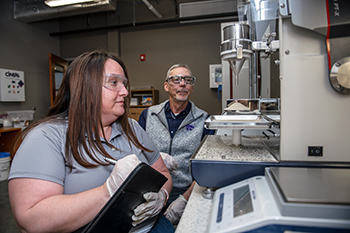 K-State's Advanced Manufacturing and Bulk Solids Technology Center, or BSTC, supports industry by improving technology and knowledge related to powder and bulk solid handling, and the manufacturing process. The center specializes in powder and bulk solids materials testing, education and research on powders and dry bulk materials.
K-State's Advanced Manufacturing and Bulk Solids Technology Center, or BSTC, supports industry by improving technology and knowledge related to powder and bulk solid handling, and the manufacturing process. The center specializes in powder and bulk solids materials testing, education and research on powders and dry bulk materials.
The Bulk Solids Technology Center is the only university-centered facility in North America dedicated to improving technology and knowledge of powder and bulk solids handling.
Beocat

Beocat is the High-Performance Computing cluster at Kansas State University. Itis run by the Institute for Computational Research in Engineering and Science, which is a function of the Computer Science department. Beocat is available to any educational researcher in the state of Kansas (and his or her collaborators) without cost. Priority access is given to those researchers who have contributed resources.
Biosecurity Research Institute
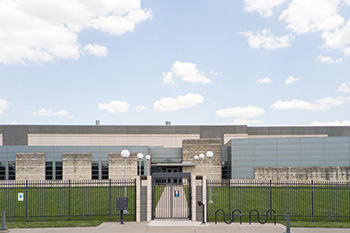 The Biosecurity Research Institute, or BRI, is the home of comprehensive infectious disease research to address threats to plant, animal, and human health, including food-borne pathogens.
The Biosecurity Research Institute, or BRI, is the home of comprehensive infectious disease research to address threats to plant, animal, and human health, including food-borne pathogens.
Confocal Microscopy and Microfluorometry Core
The Confocal Microscopy and Microfluorometry Core provides expertise, training and access to equipment for confocal microscopy and microfluorometry.
The Confocal Core serves faculty, postdoctoral fellows, students and staff of K-State. Users are not charged fees for training and use of the facility but are expected to acknowledge in all publications: Confocal Core supported by CVM-KSU.
Electronics Design Laboratory
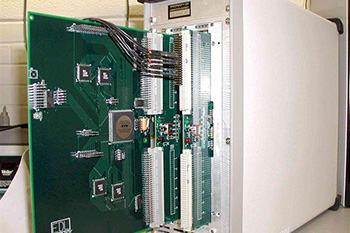 The Electronic Design Laboratory, or EDL, provides researchers with access to advanced electronics, assists with integrating electronics technology into research programs and aids in electronics technology transfer to users by providing ongoing technical support. The EDL works in cooperation with many diverse academic departments for a symbiotic approach to problem solving.
The Electronic Design Laboratory, or EDL, provides researchers with access to advanced electronics, assists with integrating electronics technology into research programs and aids in electronics technology transfer to users by providing ongoing technical support. The EDL works in cooperation with many diverse academic departments for a symbiotic approach to problem solving.
Flow Cytometry Laboratory
The Flow Cytometry Laboratory is housed in Mosier Hall, Room K208 of the College of Veterinary Medicine complex. This multi-user core laboratory is equipped with state of the art flow cytometry analyzers by Becton Dickinson (LSR Fortessa X-20 and FACSCalibur).
Geographic Information Systems Spatial Analysis Laboratory
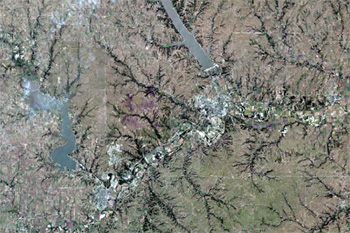 The Geographic Information Systems Spatial Analysis Laboratory, or GISSAL, is a university core facility established in 1990 as an interdisciplinary center supporting geospatial research, learning, and outreach at K-State. The lab specializes in spatiotemporal analytics and geoprocessing tool programming, cartographic and visualization support, map-based communications, GIS web service and map application development, and geospatial data portal design and deployment.
The Geographic Information Systems Spatial Analysis Laboratory, or GISSAL, is a university core facility established in 1990 as an interdisciplinary center supporting geospatial research, learning, and outreach at K-State. The lab specializes in spatiotemporal analytics and geoprocessing tool programming, cartographic and visualization support, map-based communications, GIS web service and map application development, and geospatial data portal design and deployment.
Integrated Genomics Facility
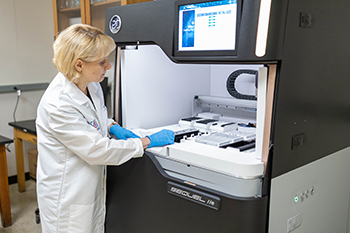 The Integrated Genomics Facility, or IGF, is K-State’s DNA sequencing core facility serving the whole campus. The facility provides service, expertise, research assistants and cutting edge technology for K-State students and faculty. The training of next-generation scientists is a key part of its mission and annual summer workshops and individual training sessions support this goal.
The Integrated Genomics Facility, or IGF, is K-State’s DNA sequencing core facility serving the whole campus. The facility provides service, expertise, research assistants and cutting edge technology for K-State students and faculty. The training of next-generation scientists is a key part of its mission and annual summer workshops and individual training sessions support this goal.
Kansas Lipidomics Research Center
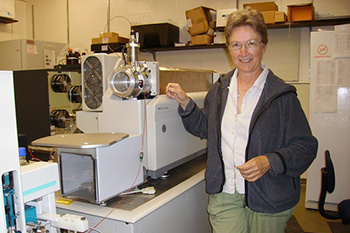 The mission of the Kansas Lipidomics Research Center is threefold:
The mission of the Kansas Lipidomics Research Center is threefold:
- The Analytical Laboratory provides comprehensive, quantitative profiling of lipid molecular species with high sample throughput using mass spectrometric technologies.
- The Technology Development Component works to expand lipid profiling and other metabolomic capabilities.
- The Scientific Research Component promotes collaborative research among lipid scientists and provide training opportunities for postdoctoral, graduate, and undergraduate students.
Molecular Biology Facility
The Molecular Biology Core provides expertise, training and access to equipment for nucleotide and protein analysis. The facility serves faculty, postdoctoral fellows, students and staff of K-State. Users are not charged fees for training and use of the facility but are expected to acknowledge in all publications: Molecular Biology Core supported by CVM-KSU.
NMR Laboratory
The mission of the Biomolecular NMR facility is to assist K-State life science researchers interested in characterizing protein domain constructs of novel biologically-important gene products, developing robust and general methods for high-level expression and isotopic (15N, 13C and 2D ) enrichment of these domains for NMR studies, applying multi-dimensional NMR methodology for determining 3D structure of these domains and in studying binding of inhibitor on protein molecules, and identifying the small molecular weight metabolites by means of NMR spectroscopy.
Nuclear Reactor Facility
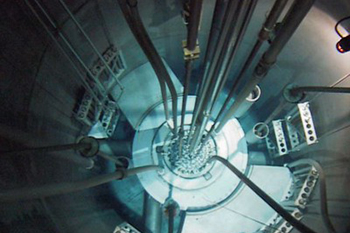 The TRIGA Mark II Nuclear Reactor Facility supports academic and education programs, research, industrial service and outreach. Students in the Department of Mechanical and Nuclear Engineering nuclear option utilize the reactor in two reactor operation laboratory classes, and as a neutron and gamma source for a radiation-detection course. The facility provides sample irradiations and tours for many other courses within the university, and provides tours for area students from grade school to college age.
The TRIGA Mark II Nuclear Reactor Facility supports academic and education programs, research, industrial service and outreach. Students in the Department of Mechanical and Nuclear Engineering nuclear option utilize the reactor in two reactor operation laboratory classes, and as a neutron and gamma source for a radiation-detection course. The facility provides sample irradiations and tours for many other courses within the university, and provides tours for area students from grade school to college age.
Protein and Biopolymer Analysis Core Laboratory
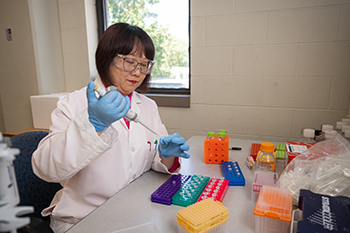 Located in room 413A of the Chemistry/Biochemistry Building, the Protein and Biopolymer Analysis Core Lab, or PBACL, provides integrated synthetic and analytical capabilities for biological materials, including proteins, peptides, and glycans. The laboratory encompasses a wide range of sophisticated technical expertise and state-of-the-art instrumentation.
Located in room 413A of the Chemistry/Biochemistry Building, the Protein and Biopolymer Analysis Core Lab, or PBACL, provides integrated synthetic and analytical capabilities for biological materials, including proteins, peptides, and glycans. The laboratory encompasses a wide range of sophisticated technical expertise and state-of-the-art instrumentation.
Stable Isotope Mass Spectrometry Laboratory
The Stable Isotope Mass Spectrometry Laboratory, or SIMSL, is dedicated to stable isotope and elemental analysis. SIMSL is equipped for the stable isotopic (‰) and elemental (%) composition analysis of carbon (C) and nitrogen (N), in organic and inorganic phases (solids, liquids and gases) as well as oxygen (O) and hydrogen (H) in water samples.
SIMSL is intended to be a hands-on teaching facility for the students at K-State, and a regional research facility for stable isotope users. The lab supports research in a multitude of natural science disciplines, including ecology, soil science, agronomy, and geology.
Statistical Consulting Laboratory
Since 1946, Statistical Consulting at K-State has focused on providing statistical expertise in support of research and scholarship of Kansas State University scientists.